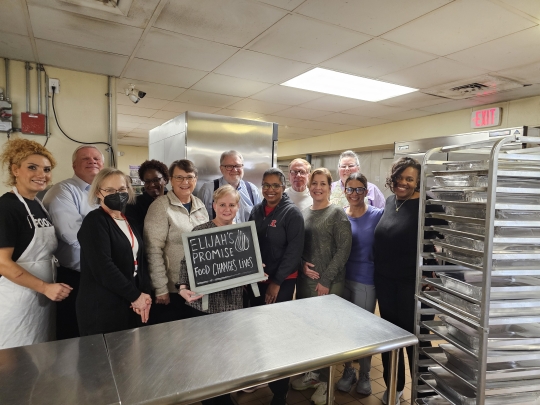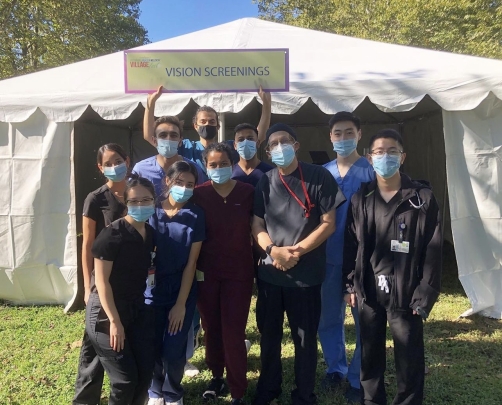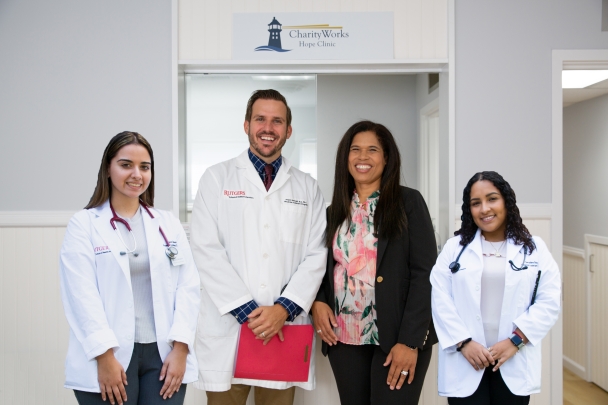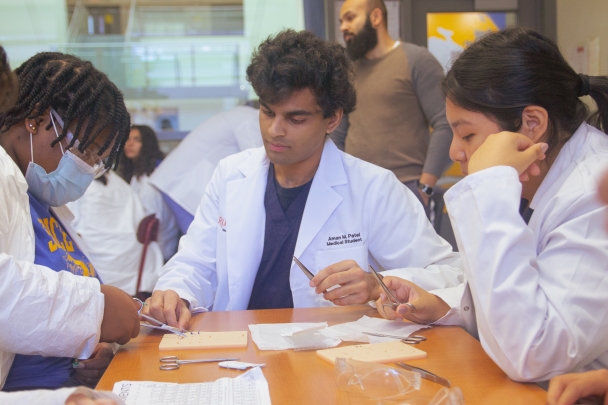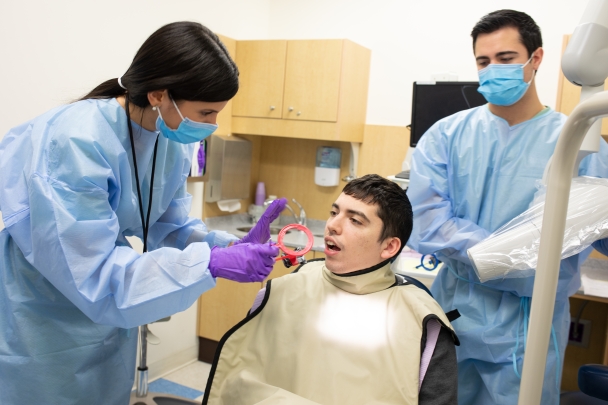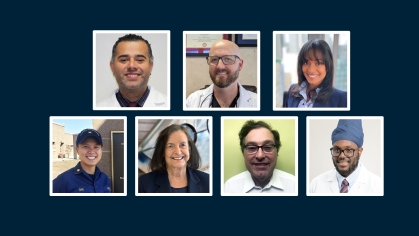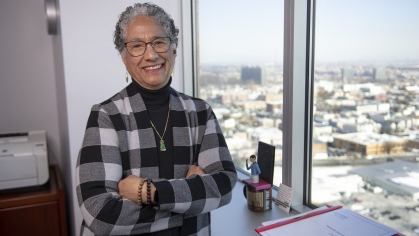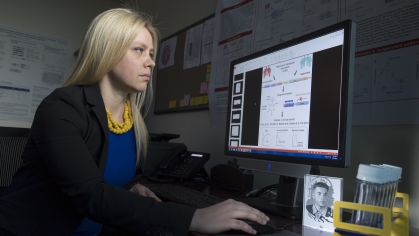Rutgers Health at 10: Addressing Health Inequities Today – and Tomorrow
As the university’s biomedical education, research and clinical care arm enters its second decade, new strategies are delivering healthier futures for New Jersey and beyond
When the Rutgers Global Health Institute was created in 2017, its leaders had a question for colleagues on campus: How many were engaged in global health?
To find out, the institute did what any group of scientists seeking answers might do: It conducted a survey.
Even today, the results paint a compelling picture of Rutgers’ commitment to health equity: Of the 653 projects identified in disciplines as diverse as business and engineering, more than half involved New Jersey populations, underscoring the idea that improving global health outcomes starts at home.
Since the founding of Rutgers Health in 2013, improving the health of New Jerseyans has been a key priority – and creating a healthier, more innovative future for the people of New Jersey has driven that mission.
Rutgers faculty, students and staff are taking measurable actions to address social, economic and racial inequities by partnering with local organizations that work with marginalized populations.
Denise Rodgers, vice chancellor for interprofessional programs at Rutgers, heads the Rutgers Equity Alliance for Community Health (REACH), a $10 million initiative to address social determinants of health in three New Jersey cities: Camden, Newark and New Brunswick. REACH’s goal is to focus Rutgers’ resources in addressing nonmedical factors that influence health outcomes, including schooling, employment and food security.
“If you’re hungry, you’re not going to have good health,” Rodgers said. “If you don’t have access to adequate housing, you’re not going to have good health. And if you have poor education, you’re less likely to have good health.”
REACH supports community health initiatives by providing community-focused grants to Rutgers faculty and staff. For example, a new REACH-funded program between the Rutgers Institute for Corporate Social Innovation and Newark Science and Sustainability Inc., will provide access to healthy food and nutrition education to 100 Newark families. Another recent grant will address barriers to home mortgage lending among low-income borrowers in Camden.
“We want to facilitate the development of sustainable longitudinal partnerships between Rutgers Health faculty and community organizations,” Rodgers said. “We also want faculty and students to get inspired by doing community-engaged scholarship.”
Similar goals are shared by other Rutgers Health institutes and centers. At the Rutgers School of Nursing, faculty conduct intervention studies to reduce health disparities, improve health equity and enhance patient safety and quality outcomes.
"A key piece of the School of Nursing’s mission is providing client and family-centered care to local communities, which it delivers through the François-Xavier Bagnoud Center's clinical practice in Newark and its statewide Child Health Program.
Meanwhile, physicians at Rutgers New Jersey Medical School (NJMS) in Newark have focused on health equity initiatives at our partner: University Hospital-Newark. State-of-the-art liver and simultaneous liver-kidney transplants and electrophysiology programs are benefiting the local community, as are other services, such as bariatric surgery at NJMS and mobile breast cancer screening and surgical care at University Hospital. When the Newark medical school integrates with Rutgers Robert Wood Johnson Medical School in New Brunswick to form the future Rutgers School of Medicine, new initiatives will further reduce health care inequities and disparities in both cities.
Similarly, the Rutgers School of Public Health, established in 1998, remains New Jersey’s only accredited school in the discipline and is rooted in the tenets of social justice and health equity. Based in Piscataway, it has been expanded to Newark as well, and offers training to members of the Newark Health Department.
At the Rutgers Cancer Institute of New Jersey, a Cancer Community Action Board ensures that research activities are informed, promote health equity and strengthen local capacity. Screen NJ, a collaboration between the institute and the New Jersey Department of Health, works with healthcare providers across the state to increase cancer screening awareness and services.
And at the Rutgers School of Dental Medicine in Newark, students and faculty provide oral care to more than 4,000 special needs patients annually.
As Rutgers Health enters its next decade of service to New Jersey, the Northeast and the world, health equity will remain a focal point, a commitment detailed in the Rutgers Health 2022-2027 strategic plan. On March 20, 2024, health care leaders gathered for the “Uncovering Solutions to Health Inequities” Symposium at Rutgers to explore solutions to health disparities in New Jersey through research, care, policy and community outreach.
Eliseo J. Pérez-Stable, director of the National Institute on Minority Health and Health Disparities, said reducing health inequality requires strong public-private partnerships – like those being forged at Rutgers.
“Academic health centers excel at promoting diversity and cultivating community engagement in the name of better health outcomes,” said Pérez-Stable. “By working together to implement what we know works, health equity can become the rule, rather than the exception.”
New Jersey Health Commissioner Kaitlan Baston, who also addressed the symposium, said achieving the highest levels of health for everyone is a priority for the state. “[Equity] keeps patients at the center of health care with appropriate community voices in the room, representing differing backgrounds, abilities and languages when designing access,” Baston said.
“We have an incredible opportunity in New Jersey to continue to build a future of health care that drives health and wellness with technological solutions and innovation, building systems around patients rather than trying to make patients fit into our systems.”
Rutgers Health is tackling a wide range of health inequities, such as cancer, heart disease and obesity. To succeed, Rutgers will continue to strengthen community partnerships and build a health system that reflects the populations it serves.
“We remain committed to ensuring that faculty and staff develop or enhance competencies to implement diversity, equity and inclusion policies and programs in their areas of expertise,” said Rutgers Biomedical and Health Sciences Chancellor Brian Strom, who leads Rutgers Health.
“At Rutgers Health, we’re looking to build a new equitable normal, rather than simply a new normal, to address racial inequity and health disparities across our state and beyond,” Strom said. “To paraphrase Albert Einstein: With challenges comes opportunity.”

